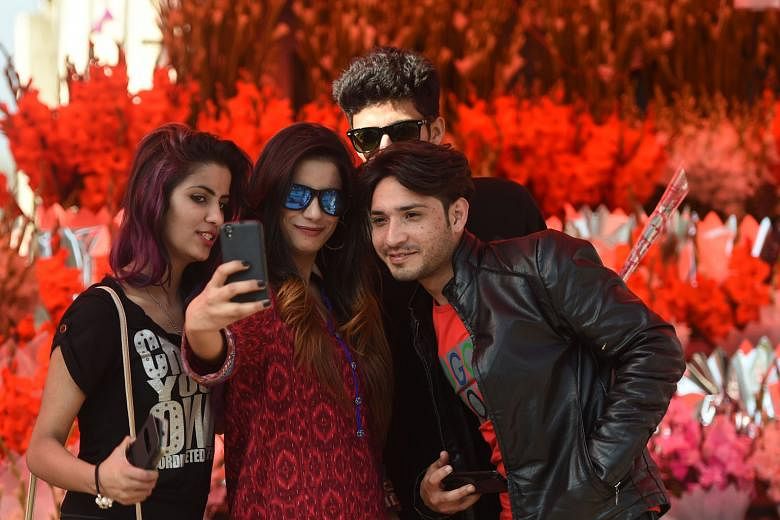ISLAMABAD • A pretty 15-year-old girl strikes a pose and pouts at the camera on her phone, so far so Generation Z, but unlike her teenage counterparts in the West, she stops short of posting the photo on social media, restricted in part by Pakistan's social mores.
It is a confusing time for the nation's youth - the arrival of 3G and 4G in Pakistan in 2014 and a massive increase in the sale of smartphones have seen social media use surge, making information about largely taboo subjects such as love, dating and sex more accessible than ever.
Young people can communicate online in relative freedom, and the country even has a controversial reality star Kim Kardashian-type figure - Qandeel Baloch, who has become famous through her tireless self-promotion and suggestive "selfies" posted on social media, amassing tens of thousands of followers. But for many in the deeply conservative Muslim nation, strict religious and familial controls still dictate behaviour - the "duck-face" selfie shot, which is almost ubiquitous on the social media pages of teens in the West, can present a hazard in Pakistan.
"In my pictures, I cannot pout any more, I've stopped doing that, because otherwise people judge," the girl said on condition of anonymity. "You cannot post a picture outside with your friends, because your relatives, or friends, or teachers will criticise you. They will say, 'You look like a slut. Why are you smiling?'," she explained. "So now, I barely change my profile picture any more. When I started using social media, I thought I'd be a pretty girl with a lot of friends online. But I'm just an awkward girl with five friends."
The story is echoed by some of her classmates at a middle-income private school in Islamabad, where teenage boys and girls spoke candidly about their online experiences, but declined to be named.
"It all comes back to religion. We are in an Islamic state. People here will judge you because Islam doesn't encourage girls to show their legs, or arms, and it doesn't encourage boys and girls to interact," said a 14-year-old boy who described being scolded by relatives after posting a picture of himself with a girl.
Globally the perils women face online are well-documented but Pakistan's teenage girls face multiple issues - not only can their behaviour be judged as tarnishing the families' reputation or honour, but there are also rising incidents of cyber misogyny and harassment.
But there is also a sense of growing defiance in the country, where around two-thirds of the population - roughly 180 million people - are believed to be under the age of 30.
The 15-year-old girl, whom Agence France-Presse spoke to, is calling on her peers to be more confident online, instead of hiding behind Pakistani cultural restrictions.
She said: "You can't blame society for everything... You can't be a wimp all your teenage life and do nothing. And you can do (something) on social media."
AGENCE FRANCE-PRESSE

